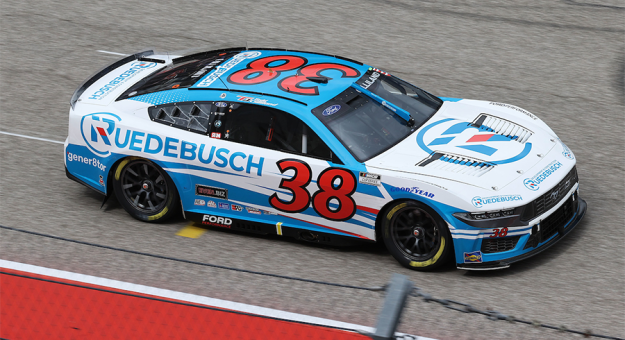According to Todd Gilliand, Front Row Motorsports is only at the tip of the iceberg as far as the team’s new technical alliance with Team Penske goes.
Ahead of the Daytona 500, Front Row established a renewed partnership with its Ford counterparts, which elevated the Bob Jenkins-owned operation to a Tier 1 status.
In short, that means Front Row and Team Penske now share engineering, aerodynamic, setup, strategy and pit crew data.
Already, the two-car NASCAR Cup Series team has seen substantial improvement in performance with its No. 34 driver, Michael McDowell.
The series veteran earned pole position for the first time in his career at Atlanta Motor Speedway during the second race of the season on Feb. 26.
Since then, McDowell has maintained an average starting position of 9.7.
Meanwhile, in the other FRM hauler, Gilliland and his No. 38 crew are still searching for more. In six races, the 24-year-old has an average start of 24.2 and an average finish of 25.7.
Things appeared to be headed in the right direction for the No. 38 during qualifying at Richmond (Va.) Raceway on Saturday, with Gilliland qualifying sixth in the 36-car field.
“It was a solid day, but we still need to keep working on a bunch of stuff, especially kind of longer runs because everyone gets to a point where they’re not comfortable,” Gilliland said. “Definitely multiple positives to take from today.”
It was his second-best qualifying effort of the season, with his top starting position being fourth at Atlanta Motor Speedway.
During Gilliland’s media availability at Richmond on Saturday afternoon, he provided some additional insight regarding the technical alliance with Team Penske has progressed.
“As far as drivers go, we’re not in the meetings or anything but our crew chiefs go over there once or twice a week. They have lots of meetings and those are the more important meetings for sure,” Gilliand explained.
While he might not be part of the closed-door conversations, Gilliland has witnessed marked improvement from FRM as a whole when it comes to speed.
“I think we definitely have just had really fast cars and that comes from having aero information, unloading with good setup information that we have so many more data points now to go off of. Even if it’s hitting our balance right,” Gilliland said. “You go to the race track with whatever setup you have, but being able to hit your balance right for whatever amount of grip you have is still super important.”
At the same time, the North Carolina native also knows the technical alliance isn’t a magic fix to FRM’s longtime struggle to reach victory lane.
In the team’s 20-year history, it has collected four Cup Series wins.
“This is a tough series. It takes everything,” said Gilliland, who has yet to win a Cup Series race in his young career. “(But) with all the extra information I think we’re able to narrow it in into a smaller window with more data once we get to the race track.”
There is certainly hope floating around at FRM, and Gilliland is in the camp of believers.
“We’re just getting to a better spot where we’re gonna continually use it better and better throughout the season,” Gilliland said.
